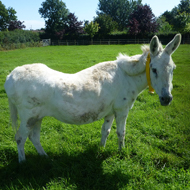
Panel shares views on encouraging horse owners to recognise obesity.
A group of experts has concluded that teamwork, communication and trust are key to tackling the growing problem of equine obesity.
At the recent National Equine Forum’s (NEF) Great Weight Debate, a panel including equine vet Lucy Grieve shared their views on encouraging horse owners to recognise obesity and address the problem.
Ms Grieve said: “Vets are in unique and privileged position to provide an achievable and effective tailor-made strategy for individual horses. We must all learn to overcome avoidance and engage recognise, accept and understand, and tailor a solution.”
Horse owner and panellist Helen Gale added: “Owners need to be able to recognise and acknowledge that their horse has a weight problem and be motivated to take action. Communication is key. It’s important for others to understand why you are following the advice from vets and other experts and how they can best help.”
The panel also recognised that a bespoke approach is required for every horse, owner and situation. They acknowledged that some livery owners may face challenges in changing management practices and that peer- pressure on a yard may prevent people from implementing intake restriction measures such as a grazing muzzle or restricted turnout.
Livery yard owner and coach Beth Maloney, who was also on the panel, said: “Peer pressure can be daunting, and there can be a lack of confidence that you are doing the right thing,”
The Great Weight Debate (Equine) was attended virtually by some 170 delegates from across the world ahead of the virtual 29th NEF in March. Tickets for the NEF will be available later this month.
For more information and to sign up to the mailing list, click here.



 The Veterinary Medicines Directorate (VMD) is inviting applications from veterinary students to attend a one-week extramural studies (EMS) placement in July 2026.
The Veterinary Medicines Directorate (VMD) is inviting applications from veterinary students to attend a one-week extramural studies (EMS) placement in July 2026.